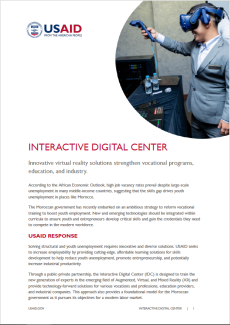Innovative virtual reality solutions strengthen vocational programs, education, and industry.
According to the African Economic Outlook, high job vacancy rates prevail despite large-scale unemployment in many middle-income countries, suggesting that the skills gap drives youth unemployment in places like Morocco.
The Moroccan government has recently embarked on an ambitious strategy to reform vocational training to boost youth employment. New and emerging technologies should be integrated within curricula to ensure youth and entrepreneurs develop critical skills and gain the credentials they need to compete in the modern workforce.
USAID RESPONSE
Solving structural and youth unemployment requires innovative and diverse solutions. USAID seeks to increase employability by providing cutting-edge, affordable learning solutions for skills development to help reduce youth unemployment, promote entrepreneurship, and potentially increase industrial productivity.
Through a public-private partnership, the Interactive Digital Center (IDC) is designed to train the new generation of experts in the emerging field of Augmented, Virtual, and Mixed Reality (XR) and provide technology-forward solutions for various vocations and professions, education providers, and industrial companies. This approach also provides a foundational model for the Moroccan government as it pursues its objectives for a modern labor market.
The IDC provides access to XR technologies, including a virtual showroom, a development lab, and a research and development hub for products and applications. The IDC builds professionals’ ability to use XR technology in their daily work, thus preparing them for the jobs of the future. Furthermore, the center will become a pillar of the future of education in Morocco, as it will train professors and trainers on XR usage to create innovative lessons, thereby offering students advanced learning solutions that respond to labor market demand.
RESULTS TO DATE
- Established a fully functional IDC in Ben Guerir with state-of-the-art equipment and AVR technology;
- Developed and adapted a six-month training course for a Virtual Reality and Innovation Academy to train the next generation of XR experts;
- Trained 152 XR experts to develop applications on Augmented, Virtual, and Mixed Reality;
- Reinforced the educational outcomes of 797 professionals in sectors such as automotive engineering, aeronautics, and others, including Office for Vocational Training and Job Promotion (OFPPT) personnel;
- Trained more than 240 professors from several universities and training centers on AVR technology to create or upgrade innovative lessons;
- Developed XR modules for bachelor's and master's degrees in collaboration with Mohammed VI Polytechnic University School of Architecture and other engineering schools; and
- Initiated collaborations with several potential partners, such as OFPPT, the Ministry of Tourism, the Ministry of Culture, Youth and Sports, and engineering schools.
FACTS & FIGURES
IMPLEMENTING PARTNERS:
- EON Reality
- Mohammed VI Polytechnic University
- The Agency of Digital Development
- Mohammed V University in Rabat
HOST-COUNTRY PARTNERS:
- The Moroccan Ministry of Higher Education, Scientific Research, and Innovation
- The Moroccan Ministry of Industry, Investment, Trade, and Digital Economy
BUDGET:
LOCATION:
DURATION:
KEY CONTACT:
Salma Kadiri
Project Management Specialist
skadiri@usaid.gov


